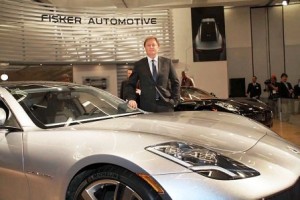
Shown here with the $103,000 Karma, former Fisker Automotive Chairman Henrik Fisker was grilled on Capitol Hill.
Fisker Automotive may be running out of options other than bankruptcy, the floundering battery-carmaker’s chief operating officer conceded during an often contentious hearing on Capitol Hill.
The maker — which recently laid off 75% of its U.S. staff and this week saw the U.S. Energy Department seize the company’s emergency reserve funds – has been at the heart of a partisan battle over a program created by the Obama Administration to support clean car technologies. The GOP-controlled House Oversight Committee ordered three current and former Fisker executives, as well as the head of the Energy Dept. loan program to testify about the likely collapse of the automaker.
“I do not know exactly what the future holds for Fisker Automotive, including whether the company will be able to find new investors,” said COO and co-founder Bernhard Koehler, “or whether the company may be obliged to seek bankruptcy protection to facilitate its continued efforts to preserve value for all stakeholders.”
The hearing revealed some potentially embarrassing paperwork, including a June 2010 DoE e-mail questioning whether Fisker was meeting the strict benchmarks the agency had established in order to be able to tap a $529 million low-interest loan. The maker, cautioned loan program official Sandra Claghorn, “may be in limbo due to a lack of compliance with financial covenants.”
The Energy Department decided to continue providing access to the loan, albeit in small bites, until 2011, by which time Fisker had drawn down $192 million – but was still struggling to get its first model, the Karma plug-in hybrid, into production. Development of a second vehicle intended to put Fisker into a more mainstream segment of the market, has never been completed.
The Energy Department has since described the 2010 e-mail as the opinion of just “one person” among those at a meeting discussing options for Fisker and, in fact, a spokesperson for the DoE said the maker provided the necessary certification five days later.
But the uncertainty about Fisker’s ability to comply with the loan benchmarks, and its current financial collapse, helped fuel intense partisan bickering during the House hearing.
“Fisker should have never received taxpayer money,” argued Rep. Jim Jordan, R-Ohio. “Taxpayers effectively subsidized luxury, novelty vehicles for the likes of Justin Bieber, Leonard DiCaprio and Al Gore,” three celebrity customers who have purchased Fisker Karma plug-ins.
The Obama Administration’s support for clean energy has come under frequent fire, especially following the collapse of Solyndra, a solar cell manufacturer that defaulted on millions of dollars of its own loans. That debacle was frequently cited by Republican nominee Mitt Romney during the 2012 presidential campaign.
Democrats on the Oversight Committee fired back during the hearings, Rep. Gerry Connolly, D-Va., called the session a “Soviet show trial.” Meanwhile, Rep. Elijah Cummings, D-Md., and the committee’s most senior Democrat, insisted, “There is no evidence the Department did anything wrong with this loan,” Cummings said. “No evidence that politics played any part in the award to Fisker.”
While politics will likely continue to fuel the debate, Fisker Automotive’s founder, the eponymous Henrik Fisker, defended the company’s efforts to bring “cutting-edge technology” to the market which could “pave the way for a new generation of American car manufacturing.”
The Fisker Karma ultimately did go on sale in early 2012 and received strong kudos for its styling, but the sleek 4-seater also was faulted for its weight and performance and demand lagged well behind the company’s optimistic sales forecast.
Complicating matters, the Karma was the target of a series of recalls and service actions, notably including one triggered by a fire involving a cooling system fan, another triggered by manufacturing defects at battery supplier A123 – which itself went bankrupt and was later sold to a Chinese maker who renamed the firm B456.
Fisker Karma production was put on hold last summer. Plans for the smaller and less expensive Fisker Atlantic – which was supposed to be produced at a former General Motors plant in Delaware – were indefinitely delayed.
In a report earlier this week, TheDetroitBureau.com quoted a very well-placed source who had considered joining the firm at a senior management level but decided not to accept the offer from Fisker after inspecting its books, which the source described as “a mess,” adding that, “It is likely going to take a forensic accounting team to understand how they could have gone through all that money.”
Along with the $192 million borrowed from the DoE, Henrik Fisker noted the maker had raised over $1.2 billion in private capital before he tendered his resignation in March.
Such concerns apparently were raised within the DoE, a December 2011 report by Energy Department consultant Grant Thornton LLP citing “Poor oversight of complex supply chain,” and warning that “Fisker had significant accounting and payables management lapses.”
The questions about Fisker could soon move from Capitol Hill to a bankruptcy court, it now seems.

I hate to see any U.S. Biz go out and the employees lose their job but this was almost a certainty considering the pie-in-the-sky Biz model. Naturally tax payers and investors are the ones who lose, not the execs who were over-compensated for in this charade.